The Remarkable Benefits of Ketone Bodies: Unlocking an Alternative Energy Source
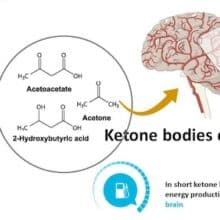
The many benefits of ketone bodies upon our health is proving to be remarkable, especially on the elderly. Discover how increasing the production of ketones in your body may improve overall health, metabolism and aging.
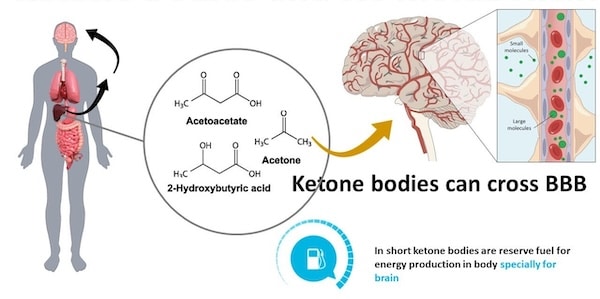
Credit: Animated biology YouTube Channel. Image shows ketones crossing the blood-brain barrier
Last year I participated in the first human clinical trial conducted at the Buck Institute of Aging in Novato, California. It was called the BIKE Study (Buck Institute Ketone Ester Study). In this post, I’m going to tell you a lot about ketones, and why geroscientists, are keen on studying their effect on healthspan and longevity, but suffice to say right now:
Ketones are a type of molecule produced by the liver when there is a lack of carbohydrates/glucose for the body to use as fuel. They are an alternative energy source for the body.
Here’s what’s covered:
- What was the BIKE study
- Introduction to ketone bodies
- Ketones vs glucose
- The aging impact on ketone metabolism
- Ketones and cellular senescence
- Boosting ketones through diet and lifestyle
- Potential therapeutic uses of ketone supplements
- Videos by Drs. Verdin, Newman and Stubbs
Let’s dig in…
What was BIKE?

No, not that kinda bike.
Briefly, here are the key points that summarizes the BIKE study [1]:
- The BIKE study investigated the effects of a ketogenic drink on biomarkers of aging and longevity.
- It was a randomized controlled trial involving healthy participants aged 50+ years old (the oldest was 90).
- The trial compared the effects of the consumption of a 12-week ketogenic diet against a control group on a standard diet without exercise interventions.
- Buck researchers analyzed changes in biomarkers associated with aging, including inflammation, oxidative stress, insulin resistance, and cellular senescence.
- The objective was to determine if (1) ketone drinks were safe and tolerable in older adults, and (2) to explore if ketone drinks could replicate the benefits seen with caloric restriction and ketogenic diet as studied in animal models.
- The study is led by Buck Institute professor John Newman, MD, PhD, and Translational Scientist Brianna Stubbs, DPhil.
- It enrolled 30+ participants divided evenly between the intervention and control groups. The intervention group consumed ketones; the control consumed a placebo.
- Participants provided blood and other biological samples throughout the trial to track biomarker changes.
Given my predilection for learning all I can about longevity, I jumped at the chance to be in the cohort studied. I didn’t know which group I was in until a few days ago when, after reviewing the data from the trial, the Buck invited the cohort to the Buck to mingle with one another and watch a presentation that reviewed the BIKE study and preliminary results.
The BIKE scientists need more time to dig into the details, and so could only show us preliminary analyses, but the one thing they suggested might be happening grabbed my attention — the level of SASP inflammatory markers might have been reduced in the brains of those individuals in the intervention group, the group that consumed the ketones.
What is SASP and why should you care about it?
I will cover SASP (senescence-associated secretory phenotype) below in some detail. Suffice to know here is that there is emerging scientific evidence that possibly shows a connection between elevated ketones and lower SASP in the elderly.
The reason this is important is because as we age, more of our cells become senescent (cells that have stopped dividing). Senescent cells produce SASP and SASP secrete various inflammatory factors that damage us in various ways. Again, more on that later after we explore the world of ketones.
Introduction to Ketone Bodies
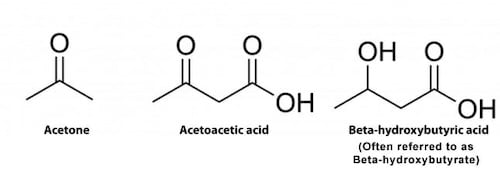
Ketone bodies are organic compounds produced by the liver during periods of low carbohydrate intake, prolonged fasting, or certain metabolic disorders, such as diabetic ketoacidosis (insufficient insulin to allow blood sugar into cells to use as energy), and certain inborn errors of metabolism like propionic acidemia (a rare genetic defect that affects the body’s ability to process certain proteins and lipids (fats)) [2].
Ketones are often referred to as “ketone bodies” because there are actually three main types produced:
- Acetoacetate
- Beta-hydroxybutyrate (BHB)
- Acetone
Note: BHB is often depicted as one of the three main types of ketone bodies; however BHB is technically a carboxylic acid – not a ketone body
Acetoacetate and BHB are primarily used for energy, while acetone is a byproduct that is expelled through respiration.
These water-soluble molecules serve as an alternative fuel source for the body, particularly for the brain, when glucose levels are low. The body has this backup energy reserve in the form of ketones to provide an alternative fuel source when glycogen stores in the liver are depleted, such as during periods of fasting or very low carbohydrate intake.
Ketone Bodies vs Glucose: Comparing Energy Sources
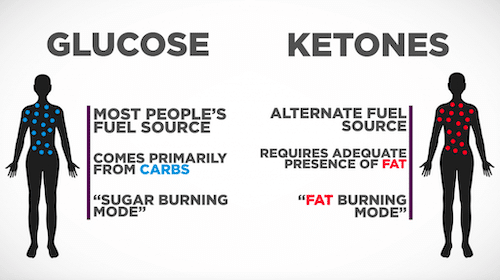
While glucose is the primary fuel source for most cells in the body, ketone bodies offer several unique advantages as an alternative energy source. Unlike glucose, ketones can cross the blood-brain barrier more readily, providing an efficient fuel for the brain. Additionally, the metabolism of ketones generates fewer reactive oxygen species (ROS) compared to glucose, potentially reducing oxidative stress [3].
One of the key differences between ketone bodies and glucose lies in their effects on ATP (adenosine triphosphate) production. ATP is the primary energy currency in cells, and its levels play a crucial role in cellular function and energy homeostasis.
Research has shown that ketone bodies can enhance ATP production through more efficient mitochondrial respiration. Mitochondrial respiration refers to the process by which cells convert nutrients into ATP, the energy currency of the cell. It involves a series of enzymatic reactions in the mitochondria, including the citric acid cycle and the electron transport chain. Ketone bodies can feed into this process more efficiently than glucose, leading to increased ATP production; in fact, BHB (beta-hydroxybutyrate) can bypass certain rate-limiting steps in glucose metabolism, resulting in a higher ATP yield per molecule of substrate compared to glucose [4].
There are at least six potential benefits of BHB (beta-hydroxybutyrate) producing a higher ATP yield per molecule of substrate compared to glucose [5]:
- Increased energy efficiency: Since BHB can generate more ATP per molecule metabolized, the body requires less overall substrate to meet its energy demands. This increased metabolic efficiency could translate into better physical/mental performance and reduced demand for energy substrates.
- Preservation of protein: When glucose is limited, the body can break down protein (muscle mass) to meet energy needs via gluconeogenesis. The higher ATP yield from BHB may help spare protein by reducing this need.
- Reduced metabolic waste; The metabolism of glucose produces more metabolic waste products like free radicals and carbon dioxide compared to ketones like BHB. The higher efficiency could mean less oxidative stress.
- Enhanced endurance: For endurance athletes, the ability to derive more ATP from a given amount of fuel could improve stamina by reducing the depletion rate of energy substrates.
- Potential therapeutic applications: The higher energy yield from BHB could benefit conditions like neurodegenerative diseases where increasing mitochondrial ATP production is beneficial.
- Appetite regulation: Some researchers speculate the increased ATP production from BHB metabolism could help regulate appetite by impacting signaling pathways related to hunger/satiety.
Overall, the higher ATP yield derived from BHB versus glucose reflects a more efficient metabolic pathway. This could provide benefits ranging from physical performance to potential therapeutic effects by optimizing energy utilization.
The Impacts of Aging on Ketone Metabolism
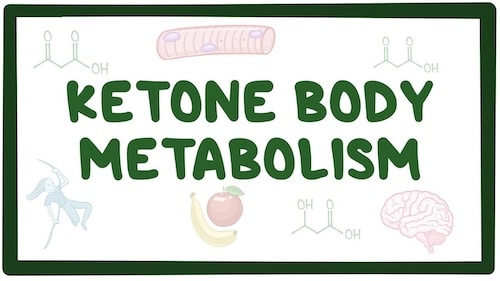
As we age, our bodies undergo various metabolic changes that can affect the utilization of different energy sources, including ketone bodies.
Studies have shown that elderly individuals may have a reduced capacity to produce and utilize ketone bodies compared to younger adults. Some key age-related metabolic changes that can impact the utilization of energy sources include factors like insulin resistance, impaired glucose/nutrient transport, reduced glycolytic/mitochondrial capacity, hormonal dysregulation, metabolic waste accumulation, physical inactivity, and gut microbiome changes — all of these can collectively contribute to age-related challenges in effectively utilizing various energy sources [6][7].
Now, turning specifically to the age-related decline related to ketone metabolism, what is known is that there is no single catalyst, but that this is multifactorial, involving changes in enzyme activities, hormone levels, and mitochondrial function.
Here are some of the key age-related factors that can contribute specifically to a decline in ketone body metabolism [8][9]:
- Decreased ketogenic enzyme activity: Enzymes critical for ketogenesis (ketone production) in the liver, such as hmg-CoA synthase and hmg-CoA lyase, may have reduced activity with aging [x]. This impairs the body’s ability to ramp up ketone production.
- Impaired mitochondrial ketolysis: The process of ketone body utilization (ketolysis) occurs in the mitochondria. Age-related mitochondrial dysfunction can hamper efficient ketolytic metabolism of ketones like BHB [10].
- Altered hormone regulation: Hormones like glucagon, cortisol, and growth hormone play roles in stimulating ketogenesis. Disruptions in their levels/signaling with aging may affect the ability to elevate ketone production [11].
- Changes in transporter proteins: Special transporter proteins like MCT1 and MCT2 facilitate ketone body uptake into tissues. Age-related changes in their expression could limit ketone utilization capacity [12].
- Reduced pancreatic function: The pancreas secretes enzymes that degrade dietary fats into fatty acids used for ketogenesis. Pancreatic insufficiency in aging may impair this process [13].
So in summary, factors like decreased ketogenic enzymes, mitochondrial dysfunction, hormonal dysregulation, changes in ketone transporter levels,and pancreatic deficiencies can all contribute specifically to an age-associated decline in the body’s ability to generate and utilize ketone bodies efficiently.
Unsurprisingly, then, emerging evidence indicates that ketone bodies may offer potential benefits for the elderly population. For instance, ketogenic diets have been associated with improvements in cognitive function, insulin sensitivity, and cardiovascular health – areas of particular concern in aging populations. (More on ketogenic diets below.)
Ketones and Cellular Senescence: Emerging Connections
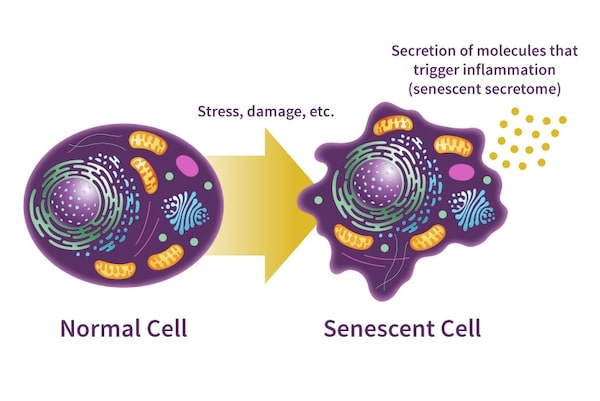
This “growth arrest” means that senescent cells have permanently stopped dividing, but they don’t die off like they’re supposed to; in effect, they are “zombie cells”. And just like the human zombies depicted in movies that bite regular folk and thereby make them zombies, SASPs can create more senescent, zombie cells through a feed-forward cycle.
Senescent cells can release inflammatory factors, known as the senescence-associated secretory phenotype (SASP), which can promote tissue dysfunction and chronic inflammation.
Some of the inflammatory factors secreted as part of the SASP, such as interleukins, chemokines, and growth factors, can cause nearby healthy cells to also become senescent; this becomes a chain-reaction or domino effect.
While SASP initially aids in clearing senescent cells, chronic exposure is harmful because it:
- Creates a state of persistent, low-grade inflammation.
- Can cause damage and dysfunction in nearby healthy cells.
- Can disrupt normal tissue microenvironments.
- Can potentially promote tumor progression and metastasis.
So while a small number of senescent cells is normal, the buildup of too many senescent cells secreting a strong SASP becomes detrimental over time. The chronic inflammation from SASP contributes to aging and plays a role in the development of many age-related diseases like cancer, neurodegeneration, and metabolic disorders [14].
Clearing senescent cells and reducing SASP is an area of intense research interest for promoting healthy longevity by reducing this source of persistent tissue damage and inflammation. Some recent studies have explored the potential role of ketone bodies in clearing senescent cells and modulating SASP. Preclinical research has shown that ketone bodies, particularly BHB, can selectively induce apoptosis (programmed cell death) in senescent cells while sparing non-senescent cells [15][16][17].
Furthermore, ketone bodies have been found to modulate the expression of certain SASP factors, potentially reducing the pro-inflammatory and tissue-damaging effects associated with cellular senescence. These findings suggest that ketogenic interventions may have therapeutic potential in targeting age-related diseases and promoting healthier aging.
For instance, a review article published in Nature Metabolism in 2020 that explored the effects of ketone bodies on SASP in the aging brain suggests that BHB can modulate SASP factors and reduce neuroinflammation in the aging brain. And although examination and interpretation of the data from the BIKE study I participated in is still ongoing, preliminary evaluation suggests that the ketone bodies consumed by the ketone-consuming group may have experienced less SASP in their brains.
Note: The best direct evidence for BHB modulating SASP is reviewed in these papers:
β-Hydroxybutyrate alleviates cartilage senescence through hnRNP A1-mediated up-regulation of PTEN
The ketone body β-hydroxybutyrate mitigates the senescence response of glomerular podocytes to diabetic insults
𝛃-Hydroxybutyrate Prevents Vascular Senescence through hnRNP A1-Mediated Upregulation of Oct4
Boosting Ketone Levels Through Diet and Lifestyle
There are several strategies that can be employed to increase circulating levels of ketone bodies in the body:
- Dietary strategies: Following a ketogenic diet, which is high in healthy fats (such as omega-3-fatty acids found in avocados, walnuts, flax/chia/hemp seeds and salmon), and very low in carbohydrates, is the most effective way to induce a state of nutritional ketosis. Additionally, intermittent fasting or prolonged fasting can also promote ketogenesis. Well-formulated ketogenic diets can be nutritious and emphasize healthy fats from sources like avocados, nuts, seeds, and fatty fish. However, it’s crucial to be mindful of the quality of fats consumed.
- Exercise and physical activity: Engaging in regular exercise, particularly high-intensity or endurance activities, can enhance ketone body production and utilization.
- Exogenous ketone supplementation: Ketone supplements, such as ketone esters or ketone salts, provide an exogenous source of ketone bodies, bypassing the need for endogenous ketogenesis. These supplements have gained popularity among athletes, individuals following ketogenic diets, and those seeking potential therapeutic benefits.
Potential Therapeutic Uses of Ketone Supplements
While dietary and lifestyle interventions are the primary methods for increasing ketone body levels, exogenous ketone supplements offer a convenient and more controlled approach. These supplements have been studied for various potential applications:
- Athletic performance: Ketone supplements have been explored as a means to enhance athletic performance by providing an alternative fuel source, reducing reliance on glycogen stores, and potentially improving recovery.
- Cognitive function: Emerging research suggests that ketone bodies may have neuroprotective effects and could potentially improve cognitive function, particularly in conditions like Alzheimer’s disease and Parkinson’s disease.
- Therapeutic applications: Ketogenic interventions, including ketone supplements, have shown promise in the management of certain neurological disorders, such as epilepsy, and may also have potential in cancer therapy and metabolic disorders like diabetes.
It’s important to note that while ketone supplements are generally considered safe, their long-term effects and optimal dosing are still being studied. As with any supplement, it’s advisable to consult with a healthcare professional before incorporating them into your regimen.
Ketones at the Buck: Presentations by Drs. Verdin, Newman and Stubbs



To give you a feel for the scientists at the Buck who study ketones (among other things), and to supplement what you’ve learned already about the value of ketone bodies to improve our healthspan, and possibly longevity, I’ve embedded video presentations by Eric Verdin, John Newman and Brianna Stubbs.
If you don’t have an appetite to watch them all, I suggest you scan the main points I’ve bulleted and watch whichever videos are of interest. You will also get a good sense for their content by reading the “What’s covered in the video” sections.
Eric Verdin: Signaling of Ketone Body SIGNALING OF KETONE BODY ß-hydroxybutyrate (BHB)
Dr. Verdin is a geroscientist, researcher, and professor who has served as President and chief executive officer of the Buck Institute for Research on Aging since 2016. His research focuses on metabolism, diet, and the different proteins and molecules that affect the aging process and its associated diseases.
Main points in his video:
- Calorie restriction increases lifespan and health span by influencing metabolite abundance.
- Ketosis can be induced through various means, including fasting and ketogenic diets.
- Beta-hydroxybutyrate functions as an HDAC inhibitor, influencing gene expression.
- Beta-hydroxybutyrate exhibits diverse signaling functions, including anti-inflammatory effects and epigenetic regulation.
- Ketogenic diets positively impact lifespan, cognitive function, and CNS health in animal models.
- Ketogenic diets show promise in mitigating epileptic activity and improving memory in Alzheimer’s disease models.
- Exogenous ketone esters offer therapeutic potential for various conditions, including neurological disorders.
- Modulating protein intake and emphasizing healthy fats in ketogenic diets may enhance their efficacy and health benefits.
What’s covered in the video:
01:22 The role of metabolites in lifespan extension:
- Calorie restriction increases lifespan and health span.
- Variation in metabolite abundance, including NAD, acetyl-CoA, and beta-hydroxybutyrate, may fill the gap between calorie restriction and improved health.
02:45 Functionality and induction of ketosis
- Ketone bodies serve as nutrients during fasting, primarily produced by the liver from fatty acids.
- Ketosis can be induced by fasting, exercise, calorie restriction, or ketogenic diets.
06:11 Beta-hydroxybutyrate as an HDAC inhibitor
- Beta-hydroxybutyrate (BHB) functions as a histone deacetylase (HDAC) inhibitor.
- BHB suppresses various HDACs, including HDACs 1, 3, and 4, at concentrations between one and three millimolar.
08:27 Diverse signaling functions of beta-hydroxybutyrate
- Beta-hydroxybutyrate exhibits anti-inflammatory effects by inhibiting the inflammasome.
- It interacts with cell surface proteins HCAR2 and FFAR3 and modulates epigenetic regulation through histone modifications.
09:08 Lifespan extension and cognitive function on a ketogenic diet
- Mice on a ketogenic diet show reduced midlife mortality and improved lifespan.
- Ketogenic diets positively impact cognitive function and CNS health, as evidenced by various behavioral tests.
11:07 Ketogenic diet effects on Alzheimer’s disease models
- Ketogenic diets mitigate epileptic activity and improve memory in Alzheimer’s disease mouse models.
- Ketogenic diets potentially offer therapeutic benefits for Alzheimer’s disease by modulating inhibitory interneurons.
15:41 Exogenous ketones for therapeutic applications
Exogenous ketone esters can induce and sustain ketosis more effectively than ketone salts.
- Ketone esters are being explored for various therapeutic applications and clinical trials, including neurological conditions.
John Newman: Ketones & the Aging Brain
Dr. Newman is a professor at the Buck Institute and at University of California, San Francisco. He was one of the lead scientists in the BIKE study. His research at the Buck investigates how diet regulates the molecular pathways that control aging, with a focus on ketone bodies.
Main points in his video:
- The brain can use both glucose and ketones for energy, with ketones serving as an alternative fuel source.
- Aging and diseases like Alzheimer’s hinder the brain’s glucose utilization, potentially leading to cognitive decline.
- Ketones show promise as a therapeutic avenue to address energy deficits in Alzheimer’s disease.
- Ketones act as signaling molecules in the body, influencing various biological processes.
- Clinical trials are underway to investigate the effects of ketogenic diets and exogenous ketones on brain health.
- Understanding ketone biology could lead to the development of therapies targeting aging and age-related diseases.
- Different cells exhibit preferences for utilizing glucose or ketones for energy.
- Ketone-based interventions offer potential opportunities for mitigating age-related cognitive decline and diseases.
What’s covered in the video:
00:00 Ketones as Brain Fuel
- The brain can utilize both glucose and ketones for energy.
- Ketones serve as an alternative energy source when glucose availability is low.
- Different cells in the body have varying preferences for glucose or ketones.
04:53 Ketones in Aging and Brain Diseases
- Aging and diseases like Alzheimer’s impair the brain’s ability to use glucose efficiently.
- Ketones may offer a potential therapeutic approach to offset energy deficits in Alzheimer’s disease.
- Clinical trials are exploring the effects of ketogenic diets and exogenous ketones on brain health.
06:27 Ketones as Signaling Molecules
- Ketones play a role as signaling molecules in the body.
- They are not a direct mimic of fasting or dietary restriction but part of the biological response to them.
- Understanding ketone biology may lead to therapies targeting aging and age-related diseases.
Brianna Stubbs: Ketogenic Diet and Exogenous Ketones
Dr. Brianna Stubbs, DPhil, is a world expert in exogenous ketone metabolism and its implications for performance, resilience and health-span. At the Buck, she’s a Translational Scientist and managed the BIKE study.
Main points of her video:
- Ketogenic diet extends lifespan and health span, emphasizing exercise’s importance.
- Ketones serve as both energy sources and signaling molecules in the body.
- Ketones show potential in improving brain health, especially in neurodegenerative diseases.
- Ketone metabolism plays a significant role in heart health, offering potential treatment avenues for heart failure.
- Ketones influence intracellular communication, epigenetics, and cell senescence.
- More clinical studies are needed to determine optimal dosages and effects of circulating ketones.
- Future research aims at developing targeted interventions utilizing exogenous ketones.
What’s covered in the video:
00:00 Ketogenic Diet and Exogenous Ketones Overview
- Overview of the speaker’s journey into studying ketone biology through endurance exercise.
- Discussion on how ketogenic diet extends lifespan and health span, referencing research findings.
- Introduction to biological ketone bodies and their functions as energy sources and signaling molecules.
02:07 Biological Mechanisms of Ketones
- Explanation of endogenous ketogenesis and its role in producing ketone bodies.
- Introduction to exogenous ketones and their sources, including ketone esters, ketone salts, and ketogenic agents.
- Overview of how ketones are utilized as energy sources and signaling molecules in various tissues.
06:03 Ketones’ Impact on Brain Health
- Discussion on how ketones can rescue metabolic dysfunction in the brain, particularly in neurodegenerative diseases like Alzheimer’s.
- Overview of research showing the potential of ketone supplementation in improving brain energy status and cognitive function.
- Mention of animal studies supporting the neuroprotective effects of ketones.
09:36 Ketones’ Role in Heart Health
- Explanation of how ketone metabolism increases in the failing heart and its adaptive significance.
- Discussion on promising animal and clinical studies indicating the potential of ketone supplementation in preventing and treating heart failure.
- Overview of findings from clinical studies showing acute improvements in cardiac function with ketone infusion.
11:11 Ketones’ Impact on Intracellular Communication and Cell Senescence
- Exploration of ketones’ effects on epigenetics, including histone deacetylase inhibition and histone β-hydroxybutyrylation.
- Discussion on ketones’ modulation of inflammation through interaction with NLRP3 inflammasome.
- Introduction to ketones’ role in regulating cell senescence and promoting vascular health.
13:43 Summary and Future Directions
- Summary of ketones’ dual role as fuel and signal with implications for aging-related conditions.
- Call for more clinical studies to understand the threshold and optimal dosages of circulating ketones for therapeutic effects.
- Expression of excitement towards developing targeted interventions utilizing exogenous ketones.
Impressive that you’ve stuck with it this far!
Share this with another egghead. 🙂
Last Updated on April 1, 2024 by Joe Garma


